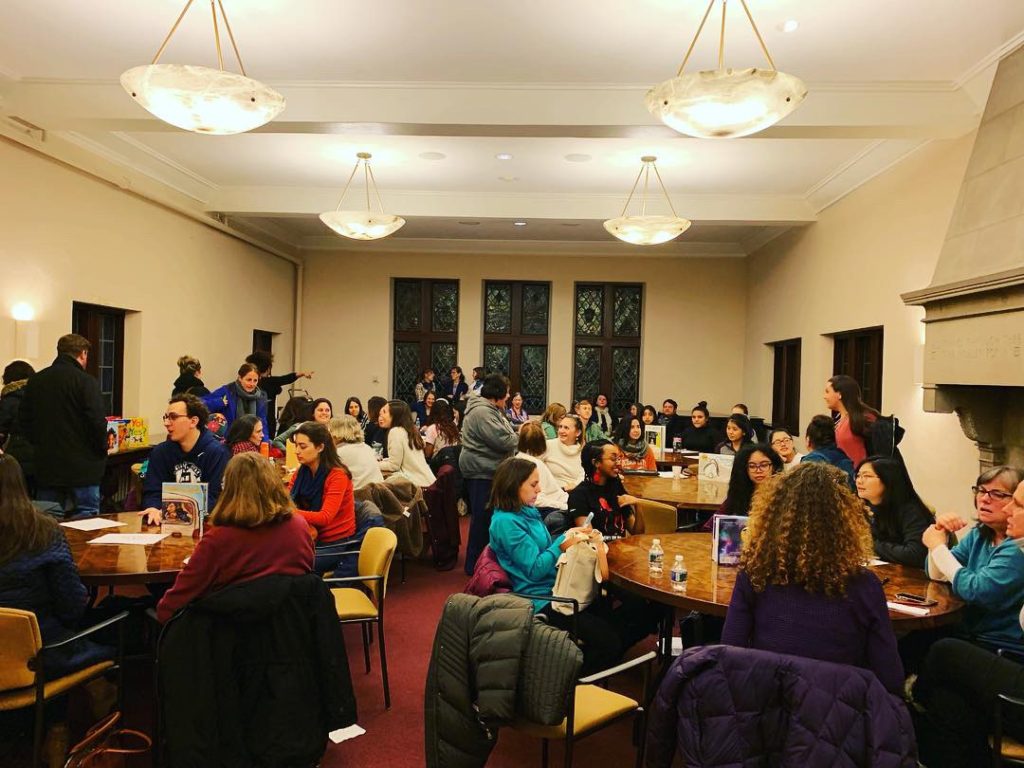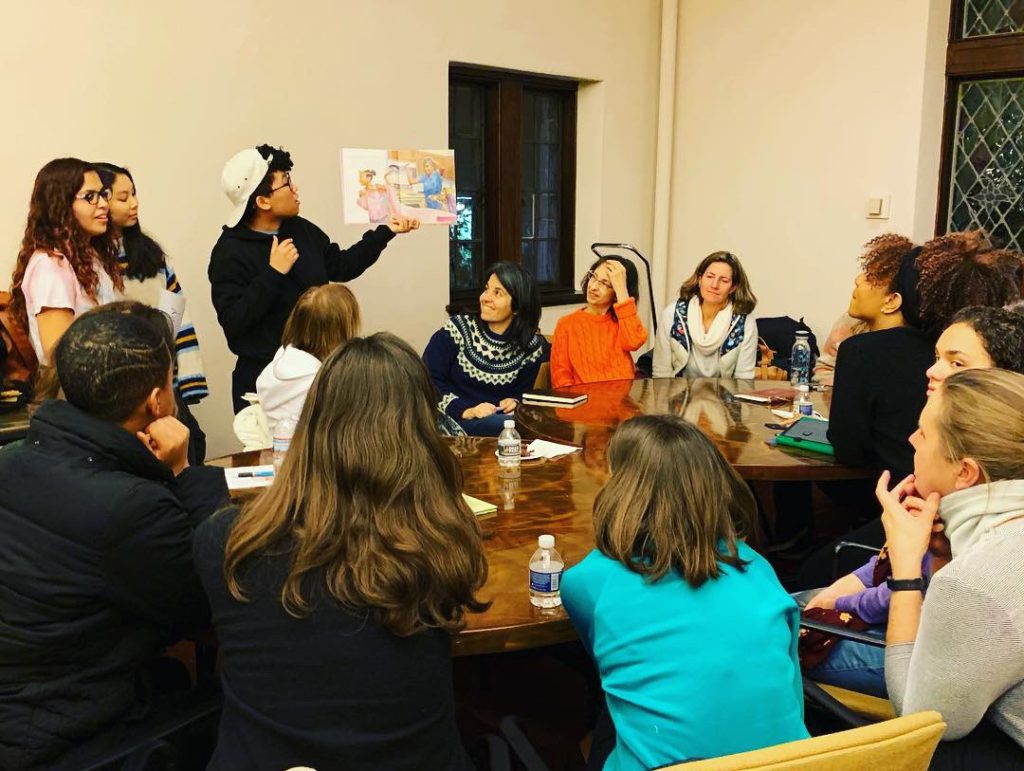A child’s innocence is often viewed as a precious, fragile thing that we must work to protect. No matter how hard a guardian may try, however, children will eventually notice differences in class, race, (dis)ability, gender, religion, and more. They will try to make sense of the differences they observe, and turn to you for guidance. Too often, we teach our children to treat these topics like the Boogeymonster: pretending that it’s invisible is the solution! But these “differences” are also the foundation upon which many inequities in our society are built. If we teach children that these differences are invisible, we are doing our children and our communities a disservice.
On March 5, the Education Department at Swarthmore College and Swarthmore Friends Nursery School co-sponsored a workshop called, “How to Talk to Kids About…” This talk was designed to help guardians address topics of race, class, gender, religion, family structure, and (dis)ability with young children. I caught wind of the initiative from a friend on campus and thought the topic was an area of growth for me. At 6:30 sharp, I made my way into Bond Hall, the location of the workshop. There were about ten round tables throughout the space. Each table had a centerpiece with one of the following words on it per table: GENDER, RELIGION, RACE, FAMILY DIVERSITY, (DIS)ABILITY, and CLASS. Due to my own experiences as an African-American woman, I gravitated toward one of the “race” tables.

Once everyone was seated, Educational Studies Professor and Philly Children’s Movement Core Member Jennifer Bradley offered opening comments. She recounted that her workshop team had expected, “no more than fifteen people to show up.” She could not help but to vocalize their surprise that several times that amount of people actually came! Bradley went to the front podium and asked the audience, “Why do we want to think about how we talk with children about identity?” She gave a two important points, that: we discuss it, “to better understand ourselves and each other”, and we discuss it in order to “disrupt policies, societal norms, and systems that continue to privilege some identities over others.”
There are still inequalities in society that oppress people of one identity while privileging people of another. When we opt to tell our children to not acknowledge differences in color, class, ability, the spectrum of gender, religion, or other ideologies, we are playing a role in keeping the inequalities functional. I personally liken it to choosing to standby in bullying. If someone is being mistreated because of who they love, how they look, dress, what they believe in, we are perpetuating their bullying when we act like we don’t see it happening. Anyone who is not actively operating against the bullying is compliant to the bullying happening. Even if we turn the other cheek or say, “It’s none of my business,” it doesn’t change the fact that someone is being bullied because of who they are. It doesn’t change the fact that we should be morally compelled to fully acknowledge that a) the person is being bullied because they are different, b) we need to respect them for who they are despite the status quo, and c) we need to act against that bully, through direct or indirect action. If we do not take action against the bully, we are siding with the bully, period. Invisible -isms act like a bully, and we must identify, discuss and disrupt them- not just stand by and allow them to continue.
At the conclusion of Bradley’s keynote, Swarthmore students in Bradley’s Diverse Young Learner course began leading workshop activities at their respective tables. Gaby was assigned to my table, and she began reading a children’s book about a little Black princess.
The little girl in the book started learning about other pretty princesses all over the world and celebrating their beautiful diversity. It’s typically uncomfortable for me to talk about race with non-people-of-color, so the children’s book was a very inviting way to help us to open the conversation. At our roundtable, we discussed in a seminar style about race and representation. We talked about the implicit messages about race, gender, body image, and culture that are perpetuated by Disney princesses, and by society as a whole. We talked about how early is too early to talk to children about race. The group leaders asked a few guiding questions throughout the conversation, and most of the conversations were organic responses to the facilitator or from one group member to another.
One thing I learned is that children’s books and other humorous or light hearted materials can be inviting ways to start difficult conversations. It’s definitely a balance, though, so that it ends up being used as a productive medium rather than a way to be indirect about addressing societal inequality. One idea I offered is that parents should consider how their identities of privilege position them and enable some parents to avoid certain conversations with their children for much longer than parents who have children of an oppressed identity. A cis- heterosexual family could potentially avoid talking about homophobia and LGBTQIA+ discrimination for much longer than a cis gendered, heterosexual family. A white family could potentially avoid talking about racism for much longer than a family of color. A wealthy family could potentially avoid talking about classism for much longer than a working class family.

to a group of parents and educators.
I believe that we must ask ourselves, if we are considering to wait to have these conversations with children, or if we address these topics in a manner that is less than clear and direct, what does that mean for people who do not have that option? For the people who are forced to confront the inequalities that accompany their identity each and every day while we decide it is just “too uncomfortable” to talk about now? What does it mean that a child is taught they should be ignoring the differences altogether, as opposed to respecting the differences and acting against all forms of inequality?
The teachings of this workshop reminded me of an important distinction that Professor Lei Bryant made in the course I took with her spring semester. The problem is not race. The problem is the systems of inequality that we put into place based on race… racism. The problem is not ideological diversity. The problem is the hateful judgements we make on others based on what they believe in…. ideological intolerance. The problem is homophobia.
So, what does that mean? It means that difference is not the fundamental problem, it’s the way that difference is treated in systems and society. It means that, instead of teaching children that there are no differences in race, class, ability, religion, gender (or teaching them that these differences do not matter), we should teach them to respect differences and to take a stand against all forms of mistreatment towards those who are different. And to start to identify the way that systems maintain and reproduce inequality.
To do so, we must first acknowledge that differences exist. This is a first step in ensuring we do not become complicit bystanders of the bullies known as racism, classism, sexism, homophobia, ableism, religious intolerance. These systems of oppression exist because those before us viewed difference as something to hate, to divide, and to eliminate. We can take the first steps toward creating true equity by respecting differences, and acting against the world’s -isms and -phobias. Learning how to talk about difference is merely the beginning of what needs to be done in order to end the world’s phobias and isms, but one thing is for sure: it’s a solid start!
talk with parents and teachers about gender.
With the overwhelming response to this workshop, several local partners are planning a series of more in-depth workshops on each topic for the 2019-2020 school year. If you are interested in being notified, please send us an email.
